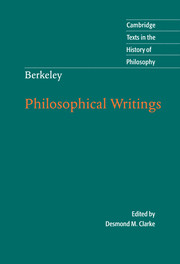Book contents
- Frontmatter
- Contents
- Acknowledgments
- List of abbreviations
- Introduction
- Chronology
- Further reading
- Note on the texts
- An Essay towards a New Theory of Vision
- A Treatise Concerning the Principles of Human Knowledge
- Three Dialogues between Hylas and Philonous
- An Essay on Motion
- Alciphron: or, the Minute Philosopher [excerpts]
- Siris: A Chain of Philosophical Reflexions and Inquiries Concerning the Virtues of Tar-Water [excerpts]
- Glossary
- Index
- Cambridge Texts in the History of Philosophy
Three Dialogues between Hylas and Philonous
Published online by Cambridge University Press: 05 June 2012
- Frontmatter
- Contents
- Acknowledgments
- List of abbreviations
- Introduction
- Chronology
- Further reading
- Note on the texts
- An Essay towards a New Theory of Vision
- A Treatise Concerning the Principles of Human Knowledge
- Three Dialogues between Hylas and Philonous
- An Essay on Motion
- Alciphron: or, the Minute Philosopher [excerpts]
- Siris: A Chain of Philosophical Reflexions and Inquiries Concerning the Virtues of Tar-Water [excerpts]
- Glossary
- Index
- Cambridge Texts in the History of Philosophy
Summary
[The Design of which is plainly to demonstrate the reality and perfection of human knowledge, the incorporeal nature of the soul, and the immediate providence of a Deity:] In opposition to sceptics and atheists. [Also, to open a method for rendering the sciences more easy, useful, and compendious.]
3rd edition 1734
[The Preface
Though it seems the general opinion of the world, no less than the design of nature and providence, that the end of speculation be practice, or the improvement and regulation of our lives and actions; yet those who are most addicted to speculative studies seem as generally of another mind. And, indeed, if we consider the pains that have been taken to perplex the plainest things, that distrust of the senses, those doubts and scruples, those abstractions and refinements that occur in the very entrance of the sciences; it will not seem strange that men of leisure and curiosity should lay themselves out in fruitless disquisitions, without descending to the practical parts of life, or informing themselves in the more necessary and important parts of knowledge.
Upon the common principles of philosophers, we are not assured of the existence of things from their being perceived. And we are taught to distinguish their real nature from that which falls under our senses. Hence arise scepticism and paradoxes. It is not enough that we see and feel, that we taste and smell a thing. Its true nature, its absolute external entity, is still concealed.
- Type
- Chapter
- Information
- Berkeley: Philosophical Writings , pp. 151 - 242Publisher: Cambridge University PressPrint publication year: 2009
- 7
- Cited by



